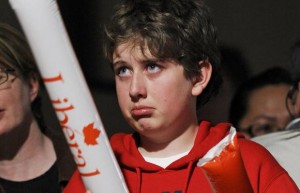Ontario Federation of Agriculture president Bette Jean Crews says she sensed a conciliatory tone and open mindedness among rural candidates in the recent federal election. She says regardless of their political stripes, they seem committed to working together on at least a couple of fronts, including the creation of a national food policy.
Each party, as well as several special interest groups, has some version of a food policy, or a vision for it. Some include farms. Others emphasize the environment. And still others deal with educating consumers.

It's tough times in Liberal land, but all parties should get a say in creating the national food policy. Pic by Victoria Times Colonist.
A government truly and democratically representing the national interests of the country will gather these assorted policy documents, try to find the commonality and then, in an inclusive, transparent way, create a policy that everyone can rally around. It will underline how a country too dependent on imports is at risk.
But, according to Crews, it will also bring focus to another matter that seems to particularly resonate with rural Canadians (perhaps because they’re closest to the land) ” that is, well over a million people around the world go hungry every day. Even more of them are poor and the retail cost of food is rising. So is the cost of producing it. As an exporting nation that has a sense of morality, we need to create a food policy that strengthens farmers’ ability to feed Canadians and others.
I write about the global implications of Canada’s elusive national food policy in my Urban Cowboy column in the Guelph Mercury.

